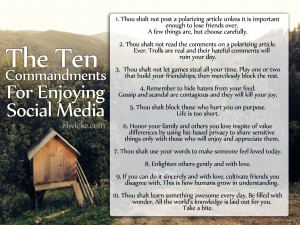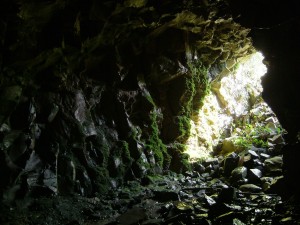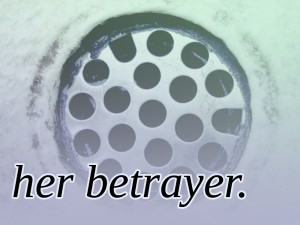Before I finished my first novel, Apocalypse Rising, I wrote a post apocalyptic novel that I called Alone. When I first started writing the story it was all about a single survivor. I shared his perspective on the world as it was after the collapse of civilization and how the collapse occurred. 
The days, months and years that followed took up a large portion of the book. I enjoyed playing through the scenarios that would lead to the end of the world and then showing what the aftermath would look like. As the story continued I wrote more and more about the character’s present life and a different story started to take shape. Soon it became less about the world and more about the people that survived within it.
Once I was finished writing the first draft and started the editing process I realized the two did not quite fit together. I thought that maybe I could take the first part of the book and move it to the middle as some sort of flashback the main character could share with the few people he meets along the way, but the more I think about it the more I think that it might be better to break it up into two separate books so that each can be the focus of what is important in each of them.
Why split them up? Why not make the make one part a smaller part of the main story rather than abandon the connection altogether? Well I’ll tell you why.
Apocalypse and Aftermath
There are a few books I have read that spent time dealing with the lead in to the apocalypse, the time during, and the time immediately after everything goes bad. Some excellent examples are Stephen King’s The Stand, Lucifer’s Hammer by Larry Niven and Jerry Pournelle, and The Grey Matter by Billie Sue Mosiman. In all three we see what leads up to the apocalypse and the author guides us through the events that take place during and after the end of the world. I really enjoy these books as much for the details of the collapse as the human story that follows. They satisfy me in ways that so many Hollywood movies fail to. Usually in Hollywood the movie is about diverting the apocalypse or the aftermath that follows, but rarely are both covered in adequate detail.
Think of Independence Day. Aliens come down and destroy all of the major population centers on the planet. The humans fight back and beat the enemy, but the movie fails to address what happens in the aftermath. Millions of tons of crashed alien spacecraft littler the planet and the population of the planet has been dramatically curtailed, so what happens afterward? And what about 2012? A massive planetary shift, depopulation of the planet and ecological devastation on an epic scale, and all we get to see is the ships full of people sailing off to Africa. Where is the follow up? What happens next? I suppose the same can be said of any Hollywood movie or novel for that matter. As the consumer we are left with questions of what next, assuming we care to ask the question.
The aftermath is every bit as exciting as the destruction itself, so I think it is important to show that rather than take it for granted. Human suffering is the perfect fodder for the novelist and I couldn’t help but try my hand at exploring the world as it fell apart.
Survival in a Time Beyond the Collapse
The other popular end of the apocalypse spectrum is the time when the death throes of civilization have subsided and the survivors must forge a new existence. Whether that existence is one of solitary survival or a return to civilization is the only real difference in the genre. Some classic examples of this are David Brin’s The Postman and The Road by Cormac McCarthy. The struggle for survival and to forge a new world with those that survived is a classic theme that has countless movies dedicated to them. There is nothing wrong with these stories, in fact I think they are fantastic, but to do them by themselves leaves the genre short. I feel cheated by the lack of detail regarding what happened to the world itself. The setting is important to these stories, but it is treated like a secondary concern. In the movie version of The Road we are never really told what caused the apocalypse, only that it happened.
These true post-apocalyptic stories focus on the story of the individual with a backdrop of a world that exists after everything else has failed. The interpersonal relationships are what matter most and drive the story beyond the events that take place in the world around them.
I want to tell a story that covers both the time before and the time after, but in a way that is personal and drives the reader to wonder about the possibilities. Can they imagine themselves in the middle of the collapsing world and consider whether or not they could survive it all? If they managed to make it, would they be the lone survivor cast adrift or the community member striving for a better tomorrow. By breaking it into two books the writer can share the collapse in a way that is personal and tell the story of survival that is easy to relate to.
So what do you think? Is all in one the way to go, or does it make more sense to break it all apart?
GIVEAWAY
About Apocalypse in the Balance:
 Five years have passed since the Angel of Death made a very public appearance in the middle of New Arcadia. Since then the city has become a hub of activity for the supernatural. Most people are blissfully unaware of the powerful forces at work in their city, and the darkness bubbling under the surface could not be happier.
Five years have passed since the Angel of Death made a very public appearance in the middle of New Arcadia. Since then the city has become a hub of activity for the supernatural. Most people are blissfully unaware of the powerful forces at work in their city, and the darkness bubbling under the surface could not be happier.
Businessman and criminal kingpin Kohaku Hitaratsu finds his world turned upside down, and he is forced to seek refuge in the slums he left behind. He no longer rules the neighborhood that was the foundation of his empire and he must find a way to survive on the streets with little more than a pickup truck to his name.
When Kohaku finds his neighborhood and his new found home under siege by monsters better found in nightmares, he chooses to stand and fight rather than simply survive.
Standing up to the darkness draws the attention of forces better left alone, and Kohaku is caught in a tug of war between the all too familiar evils of his life and the light within that is struggling to get out.
Friends and relatives choose sides in his struggle, but ultimately it is the love of a woman that will determine his course and could decide the fate of the world.
BUY IT NOW FROM AMAZON
 About the Author: Eric Swett is an author and IT professional living in Mooresville, NC. He is the husband of Tracy and the father of Zachary, Connor, and Kaitlyn. Eric is a rabid Arizona Cardinals fan and a lover of most things geek, and hes been before either of them were cool. When he is not writing or spending time with his family, he is reading and playing the occasional video game. His favorite authors include Ben Bova, H. P. Lovecraft, Robert Jordan, J. R. R. Tolkien, and L. Ron Hubbard. His favorite Bands/Musicians include The Beatles, KISS, AC/DC, Yoko Kanno, John Williams, and Imagine Dragons.
About the Author: Eric Swett is an author and IT professional living in Mooresville, NC. He is the husband of Tracy and the father of Zachary, Connor, and Kaitlyn. Eric is a rabid Arizona Cardinals fan and a lover of most things geek, and hes been before either of them were cool. When he is not writing or spending time with his family, he is reading and playing the occasional video game. His favorite authors include Ben Bova, H. P. Lovecraft, Robert Jordan, J. R. R. Tolkien, and L. Ron Hubbard. His favorite Bands/Musicians include The Beatles, KISS, AC/DC, Yoko Kanno, John Williams, and Imagine Dragons.









